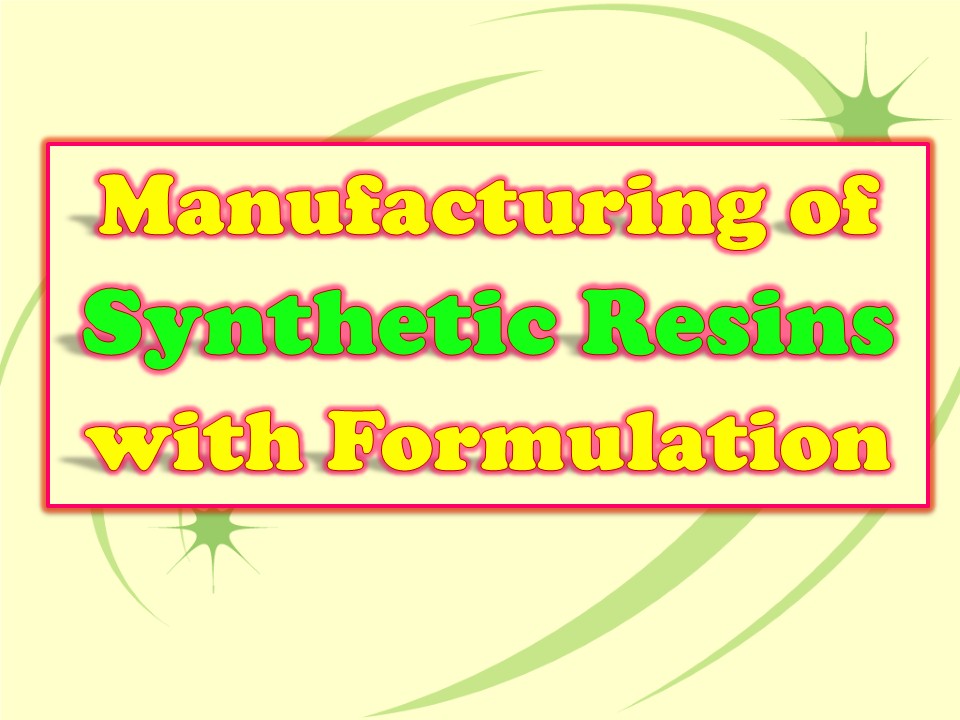
The manufacturing-of-synthetic-resins-with-formulation plays a crucial role in various industries such as automotive, construction, packaging, coatings, and electronics. These man-made polymers are engineered to exhibit specific properties like durability, flexibility, heat resistance, and chemical stability—making them ideal alternatives to natural resins. Moreover, advancements in chemical engineering have led to precise formulations that allow manufacturers to customize resins for specific end-use applications. As a result, synthetic resins have become integral to modern product development and industrial processes. In contrast to natural materials, these resins can be mass-produced with consistent quality, helping meet global demand more efficiently and sustainably.
A Deep Dive into the Manufacturing of Synthetic Resins with Formulation
Synthetic resin manufacturing involves a complex blend of chemistry, process control, and performance-based formulation. From selecting the right monomers to fine-tuning the polymerization reaction, each step impacts the resin’s physical and chemical properties. Moreover, industry-specific requirements dictate the formulation strategy—balancing strength, flexibility, thermal behavior, and adhesion characteristics. Let’s explore the key steps and considerations involved in the manufacturing-of-synthetic-resins-with-formulation.
See Also – psyllium husk (Isabgol)
Types of Synthetic Resins
Synthetic resins are categorized into two main types: thermoplastic resins and thermosetting resins, each with distinct characteristics and formulation methods.
Thermoplastic Resins
These resins soften when heated and harden upon cooling, making them highly recyclable and moldable. Common types include polyethylene (PE), polypropylene (PP), polyvinyl chloride (PVC), and polystyrene (PS). Their formulations typically involve polymerizing monomers through chain-reaction mechanisms like free-radical or ionic polymerization.
Thermosetting Resins
These form irreversible chemical bonds during curing, resulting in hard, inflexible materials. Examples include epoxy, phenolic, urea-formaldehyde, and unsaturated polyester resins. In contrast to thermoplastics, thermosetting resins are preferred in applications requiring heat resistance, dimensional stability, and high mechanical strength.
Moreover, the choice between these two types influences both the production process and the additives used in formulation.
Core Raw Materials and Additives
The formulation process for synthetic resins starts with selecting the appropriate monomers and additives, based on the desired end-use performance.
Common Monomers:
-
Ethylene and Propylene: For polyethylene and polypropylene
-
Styrene: For polystyrene and ABS
-
Bisphenol A and Epichlorohydrin: For epoxy resins
-
Formaldehyde: Used in urea, melamine, and phenolic resins
Key Additives:
-
Catalysts: Accelerate polymerization
-
Stabilizers: Improve thermal and UV resistance
-
Fillers and Reinforcements: Enhance mechanical properties
-
Plasticizers: Increase flexibility
-
Colorants and Pigments: For aesthetic appeal
-
Curing Agents: Essential in thermosetting resin systems
Moreover, these ingredients must be precisely measured and mixed to ensure uniformity and reliability in the final resin product.
Polymerization: The Heart of the Process
Polymerization is the chemical reaction that converts monomers into high-molecular-weight polymers. It is central to the manufacturing-of-synthetic-resins-with-formulation and generally follows one of two approaches:
Addition Polymerization (Chain Growth):
-
Involves initiation, propagation, and termination steps
-
Common in producing thermoplastics like PVC and polyethylene
-
Uses initiators like peroxides or UV light
Condensation Polymerization (Step Growth):
-
Produces polymers with byproducts (e.g., water or methanol)
-
Used in the production of thermosetting resins like polyesters and epoxies
-
Requires controlled conditions to prevent premature cross-linking
Moreover, process conditions—such as temperature, pressure, and reaction time—must be tightly regulated to control polymer structure, molecular weight, and branching, all of which influence final resin properties.
Resin Formulation: Tailoring Performance
Formulation is the stage where the physical and chemical traits of the resin are fine-tuned. It involves blending the base polymer with additives and modifying agents. A well-crafted formulation ensures that the synthetic resin meets industry-specific requirements.
Formulation Goals May Include:
-
Improving adhesion (for paints or coatings)
-
Increasing impact resistance (for automotive parts)
-
Enhancing thermal stability (for electronics)
-
Optimizing viscosity and flow (for molding or casting)
For example, in epoxy resin formulation, the ratio of resin to curing agent determines the hardness, setting time, and thermal resistance. In contrast, polyolefin formulations may focus more on melt flow index, UV stability, and tensile strength.
Moreover, formulation is often optimized through iterative testing and real-time feedback, especially in industries where performance standards are critical.
Processing Techniques in Synthetic Resin Manufacturing
The processed resin must then be shaped or applied using industry-standard techniques. The choice of technique depends largely on the resin’s type and final application.
Common Processing Methods:
-
Injection Molding: Used for thermoplastics in high-volume applications like packaging and consumer goods
-
Extrusion: Ideal for continuous profiles like pipes, films, and sheets
-
Compression Molding: Used for thermosetting resins in automotive and aerospace parts
-
Resin Transfer Molding (RTM): Common in making composite materials
-
Casting and Potting: Popular for epoxy and polyester resins in electrical and electronic applications
Moreover, post-processing steps such as curing, drying, or surface finishing are essential for achieving desired product quality.
Quality Control and Testing
Quality assurance in the manufacturing-of-synthetic-resins-with-formulation ensures consistency, safety, and compliance with industry regulations. Various tests are conducted throughout production:
-
Viscosity Measurement: Indicates flow behavior
-
Gel Time: Important for thermosetting resins
-
Tensile and Impact Testing: Measures strength and toughness
-
Thermal Gravimetric Analysis (TGA): Determines thermal stability
-
Spectroscopy and Chromatography: For chemical composition analysis
Moreover, in regulated industries like aerospace or medical devices, resins must comply with ASTM, ISO, or REACH standards. As a result, strict documentation and batch traceability are often mandatory.
Environmental Considerations and Sustainable Formulations
Sustainability is a growing focus in synthetic resin production. Traditionally derived from petrochemicals, synthetic resins are now being reformulated to reduce environmental impact.
Green Innovations Include:
-
Bio-based monomers (e.g., from soy, sugarcane, or castor oil)
-
Solvent-free or low-VOC formulations for paints and adhesives
-
Recyclable thermoplastics like bio-PET and PLA
-
Resins with improved lifecycle performance
Moreover, waste minimization through closed-loop systems and advanced recycling is gaining traction. In contrast to older processes, modern resin plants emphasize energy efficiency, emissions reduction, and greener chemistry.
Industry Applications of Synthetic Resins
Synthetic resins are found in virtually every industry, tailored through formulation for specific applications.
Key Sectors:
-
Automotive: Dashboard components, sealants, bumpers (PP, PU, epoxy)
-
Construction: Pipes, laminates, adhesives, coatings (PVC, epoxy, polyester)
-
Packaging: Bottles, films, containers (PET, HDPE, PS)
-
Electronics: Potting compounds, circuit boards (epoxy, silicone resins)
-
Aerospace: Composite panels, adhesives (phenolic, epoxy resins)
Moreover, 3D printing and additive manufacturing are beginning to adopt resin-based systems for producing prototypes and end-use parts, offering new levels of customization.
See Also – Caustic Potash Manufacturing
Conclusion
The manufacturing-of-synthetic-resins-with-formulation is a critical pillar of modern industry, supporting everything from automotive innovation to consumer product packaging. By precisely tailoring monomers, additives, and polymerization methods, manufacturers can deliver resins that meet stringent performance and regulatory standards. Moreover, continuous advancements in sustainability and formulation science are shaping a greener, more efficient future for resin production. In contrast to traditional materials, synthetic resins offer greater design flexibility, recyclability, and adaptability—making them essential in a rapidly evolving global market. As industries demand better, safer, and more sustainable materials, the strategic formulation of synthetic resins will remain at the forefront of innovation.





